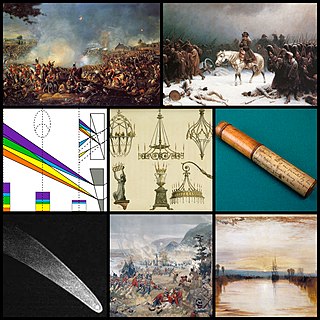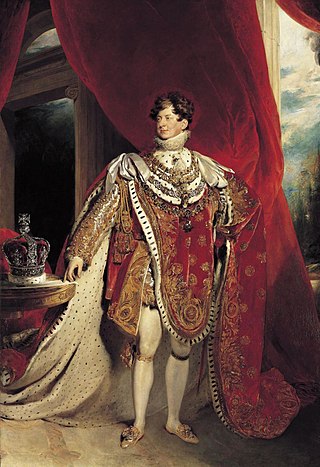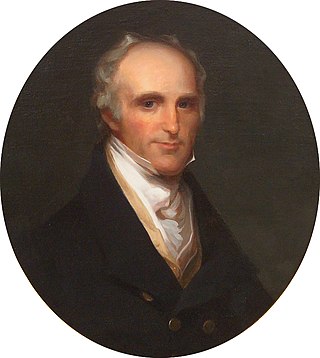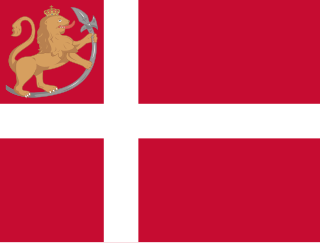
James Monroe was an American Founding Father who served as the fifth president of the United States from 1817 to 1825. He was the last Founding Father to serve as president as well as the last president of the Virginia dynasty. He was a member of the Democratic-Republican Party, and his presidency coincided with the Era of Good Feelings, concluding the First Party System era of American politics. He issued the Monroe Doctrine, a policy of limiting European colonialism in the Americas. Monroe previously served as governor of Virginia, a member of the United States Senate, U.S. ambassador to France and Britain, the seventh secretary of state, and the eighth secretary of war.

The 1810s was a decade of the Gregorian calendar that began on January 1, 1810, and ended on December 31, 1819.

George IV was King of the United Kingdom of Great Britain and Ireland and King of Hanover from 29 January 1820 until his death in 1830. At the time of his accession to the throne, he was acting as prince regent for his father, King George III, having done so since 5 February 1811 during his father's final mental illness.

George III was King of Great Britain and Ireland from 25 October 1760 until his death in 1820. The Acts of Union 1800 unified Great Britain and Ireland into the United Kingdom of Great Britain and Ireland, with George as its king. He was concurrently Duke and Prince-elector of Hanover in the Holy Roman Empire before becoming King of Hanover on 12 October 1814. He was a monarch of the House of Hanover, who, unlike his two predecessors, was born in Great Britain, spoke English as his first language, and never visited Hanover.

The House of Hanover is a European royal house with roots tracing back to the 17th century. Its members, known as Hanoverians, ruled Hanover, Great Britain, Ireland, and the British Empire at various times during the 17th to 20th centuries. Originating as a cadet branch of the House of Welf in 1635, also known then as the House of Brunswick-Lüneburg, the Hanoverians ascended to prominence with Hanover's elevation to an Electorate in 1692. In 1714 George I, prince-elector of Hanover and a descendant of King James VI and I, assumed the throne of Great Britain and Ireland, marking the beginning of Hanoverian rule over the British Empire. At the end of this line, Queen Victoria's death in 1901, the throne of the United Kingdom passed to her eldest son Edward VII, a member of the House of Saxe-Coburg and Gotha, through his father Albert, Prince Consort. The last reigning members of the House of Hanover lost the Duchy of Brunswick in 1918 when Germany became a republic and abolished royalty and nobility.

Sweden and Norway or Sweden–Norway, officially the United Kingdoms of Sweden and Norway, and known as the United Kingdoms, was a personal union of the separate kingdoms of Sweden and Norway under a common monarch and common foreign policy that lasted from 1814 until its peaceful dissolution in 1905.

A speech from the throne, or throne speech, is an event in certain monarchies in which the reigning sovereign, or their representative, reads a prepared speech to members of the nation's legislature when a session is opened. The address sets forth the government's priorities for its legislative agenda, for which the cooperation of the legislature is sought. The speech is often accompanied by formal ceremony. It is often held annually, although in some places it may occur more or less frequently, whenever a new session of the legislature is opened.

The Napoleonic era is a period in the history of France and Europe. It is generally classified as including the fourth and final stage of the French Revolution, the first being the National Assembly, the second being the Legislative Assembly, and the third being the French Directory. The Napoleonic era begins roughly with Napoleon Bonaparte's coup d'état on 18 Brumaire, overthrowing the Directory, establishing the French Consulate, and ends during the Hundred Days and his defeat at the Battle of Waterloo.

The Duchy of Brunswick and Lüneburg, commonly known as the Duchy of Brunswick-Lüneburg or Brunswick-Lüneburg, was an imperial principality of the Holy Roman Empire in the territory of present day Lower Saxony.

The State Opening of Parliament is a ceremonial event which formally marks the beginning of each session of the Parliament of the United Kingdom. At its core is His or Her Majesty's "gracious speech from the throne", which is read by the monarch but written by HM Government. In the speech the monarch gives notice of forthcoming state visits, before setting out the government's legislative programme for the new parliamentary session. No business of either House of Parliament can proceed until the Sovereign’s speech has been delivered.

The 2003 State of the Union Address was given by the 43rd president of the United States, George W. Bush, on January 28, 2003, at 9:00 p.m. EST, in the chamber of the United States House of Representatives to the 108th United States Congress. It was Bush's second State of the Union Address and his third speech to a joint session of the United States Congress. Presiding over this joint session was the House speaker, Dennis Hastert, accompanied by Dick Cheney, the vice president, in his capacity as the president of the Senate.

Richard Rush was an American lawyer, politician and diplomat who served as the 8th United States Attorney General from 1814 to 1817 and the 8th United States Secretary of the Treasury from 1825 to 1829. He served as John Quincy Adams's running mate on the National Republican ticket during the 1828 United States presidential election.

The Hartford Convention was a series of meetings from December 15, 1814, to January 5, 1815, in Hartford, Connecticut, United States, in which New England leaders of the Federalist Party met to discuss their grievances concerning the ongoing War of 1812 and the political problems arising from the federal government's increasing power.

The Burning of Washington, also known as the Capture of Washington, was a successful British amphibious attack conducted by Rear-Admiral George Cockburn during Admiral John Warren's Chesapeake campaign. It was the only time since the American Revolutionary War that a foreign power had captured and occupied a United States capital. Following the defeat of American forces at the Battle of Bladensburg on August 24, 1814, a British army led by Major-General Robert Ross marched on Washington, D.C. That evening, British soldiers and sailors set fire to multiple public buildings, including the Presidential Mansion, United States Capitol, and Washington Navy Yard.

In 1814, the Kingdom of Norway made a brief and ultimately unsuccessful attempt to regain its independence. While Norway had always legally been a separate kingdom, since the 16th century it had shared a monarch with Denmark; Norway was a subordinate partner in the combined state, whose government was based in Copenhagen. Due to its alliance with France during the Napoleonic Wars, Denmark was forced to sign the Treaty of Kiel in January 1814 ceding Norway to Sweden.

The Electorate of Hanover was an electorate of the Holy Roman Empire located in northwestern Germany that arose from the Principality of Calenberg. Although formally known as the Electorate of Brunswick-Lüneburg, it made Hanover its capital city. For most of its existence, the electorate was ruled in personal union with Great Britain and Ireland following the Hanoverian Succession.
Captain George Graham, a Virginia planter, lawyer, soldier and politician became an early federal government bureaucrat. He served twice as acting United States Secretary of War, including during the transition between the administrations of Presidents James Madison and James Monroe (1816-1817), as well as Commissioner of the United States General Land Office (1823-1830) under Presidents John Quincy Adams and Andrew Jackson.
The 1810 State of the Union Address was given during the first term of President James Madison, the fourth president of the United States. It was given on Wednesday, December 5, 1810 in Washington, D.C. It was "concerning the commercial intercourse between the United States and Great Britain and France and their dependencies having invited in a new form a termination of their edicts against our neutral commerce." It was addressed to the Senate and House of Representatives, it was given right before the War of 1812 began. It was given to the 11th United States Congress, which contains both Houses.
The 1816 State of the Union Address was the last annual address given by President James Madison, the fourth president of the United States.
The 1815 State of the Union Address was given by the fourth president of the United States, James Madison. It was given to the 14th United States Congress on Tuesday, December 5, 1815, but not verbally by the president. The War of 1812 was over, and he said, "It is another source of satisfaction that the treaty of peace with Great Britain has been succeeded by a convention on the subject of commerce concluded by the plenipotentiaries of the two countries. In this result a disposition is manifested on the part of that nation corresponding with the disposition of the United States, which it may be hoped will be improved into liberal arrangements on other subjects on which the parties have mutual interests, or which might endanger their future harmony." He concluded with, "As fruits of this experience and of the reputation acquired by the American arms on the land and on the water, the nation finds itself possessed of a growing respect abroad and of a just confidence in itself, which are among the best pledges for its peaceful career."
















